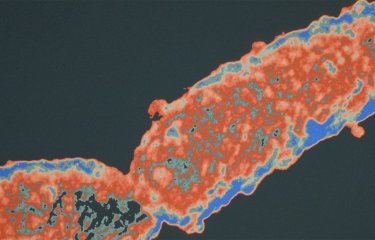The whooping cough monitoring carried out in France has enabled Institut Pasteur and CNRS researchers to analyze Bordetella pertussis, the bacterium responsible for whooping cough. For the first time, among the strains in circulation, they have identified bacteria not expressing some of the virulence factors targeted by the vaccine, such as the bacterial toxin. These observations confirm the success of the vaccination campaigns carried out in France since the 1960s.
Press release
Paris, august 25, 2009
Photo du bacille de Bordet GengouBy comparing the bacteria circulating in different world regions, some of which had carried out mass vaccination against whooping cough in children, the Molecular Prevention and Therapy of Human Diseases team (Institut Pasteur/URA CNRS 3012) was able to demonstrate last year that vaccination against whooping cough enabled strains similar to those in the first-generation vaccine to be controlled, but that others were still in circulation.
The researchers also observed that the increase of certain sequences in the bacterial genome could enable the gradual elimination of the genes encoding the virulence factors.
The scientists have now been able to confirm their theory through the genetic analysis of isolates collected in France. Their work shows the emergence for the first time, in France, in 2007 of Bordetella pertussis strains not expressing some of the bacterium’s virulence factors, such as its toxin because of the total elimination or inactivation in the bacterial genome of the genes encoding these factors.
These observations support the French policy of vaccination against whooping cough pursued since 1960, with a new vaccine that specifically targets bacterial virulence factors being introduced for children and teenagers in 1998 and for adults in 2004. High vaccine coverage will undoubtedly be able to speed up control of whooping cough.
___
Picture : Bordetella pertussis, bacille de Bordet Gengou. © Institut Pasteur Service Photo
Source
First report and detailed characterization of Bordetella pertussis isolates not expressing pertussis toxin or pertactin, Vaccine, 2009,
doi: 10.1016/J.vaccine.2009.07.074
V. Bouchez (1), D. Brun (1), T. Cantinelli (1,2), G. Dore (1), E Njamkepo (1), N. Guiso (1).
(1) Institut Pasteur, Molecular Prevention and Therapy of Human Diseases Unit, URA-CNRS 3012.
(2) currently in the Microbes and Host Barriers five-year group, Institut Pasteur.
Contacts
Institut Pasteur Press Office
Nadine Peyrolo ou Tuline Clément : 01 40 61 33 41 – presse@pasteur.fr
CNRS Press Office
presse@cnrs-dir.fr – 01 44 96 51 51



